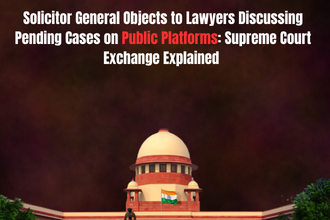The Manipur High Court has delivered a landmark ruling that restores the democratic essence of local self-governance. On August 30, 2025, a Division Bench comprising Chief Justice Kempaiah Somashekar and Justice A Guneshwar Sharma struck down a 1996 amendment to the Manipur Panchayat Raj Act, 1994, which had controversially allowed panchayat members to continue in office even after their five-year term expired.
The case titled Mayanglambam Joykumar Singh & Anr v The State of Manipur & Ors has wide implications for panchayat democracy in India, particularly in ensuring that grassroots governance adheres to constitutional limits.
Background of the Case
The Manipur Panchayat Raj Act, 1994 originally provided that the tenure of panchayat members would end after five years, as mandated by Article 243E of the Indian Constitution. To avoid a governance vacuum in case of delayed elections, the Act empowered the Deputy Commissioner to appoint either an administrative committee or an administrator for a temporary period not exceeding six months.
However, in 1996, an amendment was introduced which replaced the word “cease” in Section 22(3) with “continue” and removed the word “administrator”. This meant that even after their term had expired, panchayat members could legally continue in office until new elections were notified, creating a dual system of governance where expired members remained in office while administrative committees were also functional.
High Court’s Observations
The Division Bench held that the 1996 amendment was unconstitutional, as it was in direct violation of Article 243E of the Constitution. The Court noted that the amendment created confusion, absurdity, and anomaly, since two bodies—the expired panchayat and the administrative committee—could claim authority over the same office.
The Court stated:
- “The amendment in Section 22(3) of replacing the word ‘cease’ by ‘continue’ does not serve any fruitful purpose except for creating a confusion, absurdity and anomaly of having dual bodies for the same office.”
To resolve the conflict, the Court used the doctrine of *reading down—a judicial tool to save laws from being struck down entirely. Instead of nullifying the entire amendment, the Court restored the original wording of “cease” in Section 22(3), while upholding the removal of the word “administrator”.
Constitutional Mandate – Article 243E
At the heart of the judgment lies Article 243E of the Indian Constitution, which mandates that the term of every panchayat is five years from the date of its first meeting, and no extension is permissible.
The framers of the Constitution clearly intended to prevent indefinite holdovers by elected representatives at the grassroots level. The Manipur amendment, therefore, directly contradicted the constitutional principle of fixed tenure and periodic elections.
Impact of the Judgment
1. Restoration of Democratic Principles
The ruling reinforces that democracy at the village level must be time-bound. Panchayat members cannot overstay their tenure, and the people’s mandate must be sought afresh every five years.
2. End of Arbitrary Continuation in Office
The Court’s decision brings an end to the practice of panchayat and zilla parishad members continuing in office beyond their legal term, sometimes for years, due to delayed elections.
3. Administrative Committees Limited to Six Months
The Court clarified that under Section 22 of the Act, administrative committees can only function for six months. This ensures that temporary arrangements do not become permanent substitutes for elected governance.
4. Elections Must Be Conducted Within Six Months
Importantly, the Court directed the State government to hold elections to all panchayats within six months, thereby re-establishing the democratic cycle.
Dual Judgments on Panchayat Continuation
Interestingly, on the same day, the same Division Bench also overturned a single-judge ruling that had allowed expired panchayat and zilla parishad members to continue in office until elections were held.
The Division Bench held that this interpretation was unconstitutional and reaffirmed that panchayat governance belongs to the people, not just elected members. It also clarified that under Section 22, any voter of a gram panchayat, not only sitting members, can be appointed to the administrative committee.
Judicial Use of the Doctrine of Reading Down
The Manipur High Court’s approach is notable for its use of the doctrine of reading down. Instead of striking down the entire Manipur Panchayat Raj (Amendment) Act, 1996, the Court selectively restored the original word “cease” to maintain constitutional harmony.
This method reflects the judiciary’s preference for saving legislation whenever possible, while still protecting constitutional principles.
Wider Implications for Local Governance in India
The judgment has implications beyond Manipur, as several states often face delays in conducting panchayat elections. The ruling sends a strong signal that:
- Fixed tenure is sacrosanct: Panchayat members cannot exceed the five-year term under any circumstances.
- Temporary committees are stop-gap only: Administrative committees cannot exceed six months.
- Elections must be timely: State governments cannot indefinitely postpone elections under the guise of amendments.
This decision strengthens grassroots democracy, ensuring that governance remains representative, transparent, and accountable.
Expert Reactions
Legal experts have hailed the decision as a progressive judgment that protects the spirit of the 73rd Constitutional Amendment, which established the panchayati raj system in India.
Political analysts also view the ruling as a reminder to state governments that democratic decentralization cannot be compromised for administrative convenience.
Conclusion
The Manipur High Court’s judgment of August 30, 2025, striking down the 1996 amendment to the Panchayat Raj Act, is a landmark in safeguarding democratic principles at the grassroots level. By reaffirming the five-year limit under Article 243E, the Court has ensured that panchayat democracy remains vibrant, time-bound, and accountable.
The order not only restores the rule of law but also directs the State government to hold elections within six months, reinforcing the importance of people’s participation in local governance.
This case serves as a strong precedent for other states and a reminder that democracy cannot be diluted at any level—whether in Parliament, State Assemblies, or village panchayats.
Also Read


